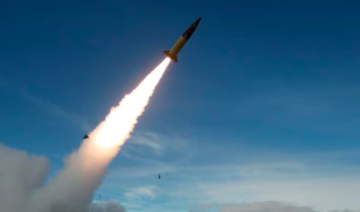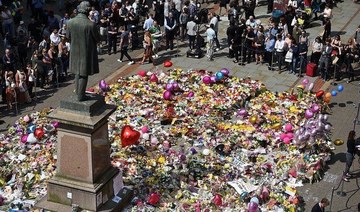WASHINGTON: Defense Secretary Lloyd Austin on Friday announced the United States will provide key air defense munitions and artillery rounds to Ukraine as part of a $6 billion military aid package that is its largest ever for Kyiv.
The package is the second this week, following another valued at $1 billion that was announced just after US President Joe Biden signed a much-delayed bill to provide new funding for Ukraine as it struggles to hold back Russian advances.
“This is the largest security assistance package that we’ve committed to date,” Austin told journalists following the conclusion of a virtual meeting of dozens of Kyiv’s international supporters.
“They need air defense interceptors, they need artillery systems and munitions. They need... armored vehicles, they need maintenance and sustainment. So all of those kinds of things are included” in the package,” he said.
Ukraine has in recent months pleaded for more air defenses from its Western allies as it struggles to fend off a surge in deadly attacks on civilian infrastructure, and the new package includes interceptors for both Patriot and NASAMS air defense systems.
But unlike the $1 billion package announced Wednesday, which featured items that will be drawn from US stocks, the latest assistance will be procured from the defense industry, meaning it will take longer to arrive on the battlefield.
Speaking at the opening of the virtual meeting, Ukraine’s President Volodymyr Zelensky said the US delay in approving new assistance has been costly for Kyiv.
“While we were waiting for a decision on the American support, the Russian army managed to seize the initiative on the battlefield,” Zelensky said.
“We can still now not only stabilize the front, but also move forward, achieving our Ukrainian goals in the war,” he said, while noting that “Ukrainian defenders need your sufficient and timely support.”
A senior US defense official said this week that “Ukrainian forces have been rationing their ammunition for quite some time, rationing their capabilities.”
Aid from the United States and other countries “will enable the Ukrainians to begin to retake the initiative,” but “this will not be a rapid process,” the official said on condition of anonymity.
“The Ukrainians will need to rebuild quite a bit to take on board all of these new supplies... and ensure that they can defend their positions. So I would not forecast any large-scale offensive in the near-term,” the official added.
The United States has been a key military backer of Ukraine, committing tens of billions of dollars in security assistance since Russia launched its full-scale invasion in February 2022.
But prior to this week, Washington had announced new aid for Ukraine on just one other occasion this year, a $300 million package in March that was only made possible by using money that the Pentagon had saved on other purchases.
A squabbling Congress had not approved large-scale funding for Kyiv for nearly a year and a half, but eventually took action starting last week after months of acrimonious debate among lawmakers over how or even whether to help Ukraine defend itself.
The US House of Representatives on April 20 approved legislation authorizing $95 billion in aid funding, including $61 billion for Ukraine, while the Senate passed the measure on Tuesday and Biden signed it into law the following day.


























